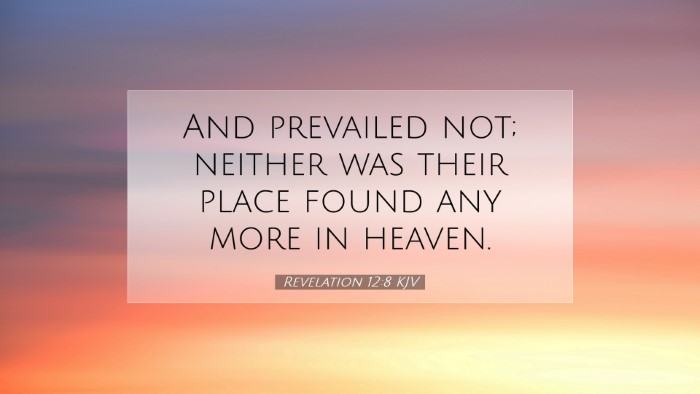Commentary on Revelation 12:8
Contextual Overview
Revelation 12:8 focuses on a pivotal moment in the cosmic battle between good and evil. This verse reads: "And prevailed not; neither was their place found anymore in heaven." Understanding this verse requires delving into the broader narrative of Revelation, particularly the cosmic struggle depicted in chapter 12. This section is rich in imagery and symbols illustrating the conflict between God’s faithful and the forces of evil.
Matthew Henry's Commentary Insights
Matthew Henry emphasizes the significance of the defeat of the dragon, representing Satan, and his angels. Henry explains that the verses prior to verse 8 establish the idea that Satan is not only an adversary but also a deceiver who seeks to devour the faithful. Henry points out that the prevailing is done by Michael and his angels, highlighting that divine assistance is crucial in the battle against evil. He asserts that although it may seem at times that evil triumphs, the ultimate victory belongs to God and His followers.
Albert Barnes' Commentary Insights
Albert Barnes notes the theological implications of “prevailing not.” He expounds that this verse is a declaration of the failure of evil powers to maintain a place in Heaven once they have been cast out. The phrase suggests a permanent displacement, which Barnes interprets as indicative of God’s sovereignty over the universe. He encourages believers to understand that this promise of God’s triumph should inspire hope amidst trials, reaffirming that no evil can stand against the power of God’s purpose.
Adam Clarke's Commentary Insights
Adam Clarke provides a detailed examination of the symbolism inherent in the verse. He suggests that the phrase “neither was their place found anymore in heaven” underscores the idea of a definitive separation between the realms of light and darkness. Clarke also asserts that this event signifies not only a moment of victory but the assurance of future judgment for evil forces. He implores readers to recognize the significance of their own allegiance to God's will, as it determines one's standing in the cosmic struggle.
Thematic Analysis
The Victory of God
Each commentary illustrates the overarching theme of God's assured victory over evil. This theme is central in Revelation and serves as a source of strength for believers facing adversity.
The Reality of Spiritual Warfare
The text invites reflection on the reality of spiritual battles. It reminds believers that they are engaged in a cosmic conflict. The acknowledgment of this struggle encourages vigilance and reliance on God’s strength.
The Finality of God's Judgement
Clarke’s emphasis on the permanent removal of evil from Heaven calls attention to the finality of God’s judgment. This aspect promotes a sense of urgency in the call to righteousness and holiness among believers.
Practical Applications for Believers
- Encouragement in Trials: Believers are urged to draw strength from the knowledge that God has already secured victory over evil, providing hope in the face of difficulties.
- Awareness of Spiritual Warfare: This verse serves as a reminder for believers to remain vigilant and active in prayer, recognizing that their struggles may have spiritual roots.
- Call to Righteous Living: Understanding the consequences of spiritual failure can motivate believers to pursue holiness and maintain their place in the heavenly realm.
Concluding Thoughts
Revelation 12:8 encapsulates the essence of the Christian assurance of victory and the ongoing battle against spiritual forces. The insights provided by Matthew Henry, Albert Barnes, and Adam Clarke provide a rich tapestry of understanding that equips believers, scholars, and students alike. It serves as a powerful reminder that while the battles may rage on, the ultimate outcome is secured by the sovereignty of God. Thus, they are encouraged to remain firm in faith, relying on God's promises as they navigate the complexities of spiritual warfare.


